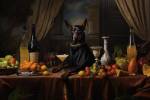Cypress Hill
As a kid, he wanted to be a Air Force pilot.
"Now I get high in different ways," B-Real chuckles.
You don't have to wind up the MC for long-running, reefer-lovin' Latino hip-hop forebears Cypress Hill to get him going.
He's a genial, easy talking kind of guy, as quick with a laugh as he is with a rhyme.
And, for a man whose albums have always come tattooed with parental advisory stickers, he's a disarmingly polite and mild-mannered presence -- the one time he begins to let an F-bomb slip during a recent conversation, he quickly catches himself and apologizes.
B-Real's bright mood clashes with Cypress Hill's dark, brooding aesthetic, which has generally been colored pitch black by murky, smoked-out beats, equally stoned and sinister lyrics and a heavy metal-esque, skull-covered imagery.
But the rapper has reason to be in relatively good spirits: After a prolonged gestation period between albums, Cypress Hill recently dropped "Rise Up," the group's first disc of new material in six years.
The album is a mix of the various styles that have come to define the group during the latter part of its 20-plus year career: It's a mix of chest-thumping gangsta rap tropes, touches of bass-heavy funk and a pronounced hard rock streak.
Cypress Hill was a precursor of the rap-rock boom of the mid-'90s, directly inspiring bands such as Rage Against the Machine and Korn, whose guitarists aped producer/DJ Muggs' siren-strewn sound.
Two decades ago, Cypress Hill was the rare hip-hop act to actively tour with rock and metal bands, taking the aforementioned Rage out on the road with them on one of their first big tours and playing festivals such as Lollapalooza.
In the ensuing years, Cypress Hill's sound came full circle and began to encompass more and more rock elements, namely crunchy, metallic guitar riffing, culminating with the release of 2000's "Skull & Bones," a two-disc set with one CD of rap-oriented material and one with more rock-centric jams.
"Rise Up" fuses the two once again, with guests ranging from Rage guitarist Tom Morello to Latin crooner Marc Anthony, the result being perhaps the group's most invigorated sounding effort in more than a decade.
"That was definitely the goal, to give both sides of us, because we are very capable of doing both those types of styles," B-Real says. "We wanted to make an aggressive record, something that was uptempo, something that would work in the live arena, because that's where we've always won people over. But at the same time, we didn't want to have everything so aggressive that it's too overwhelming, so we tried to add that funk to it and the dark, humoristic side of who we are."
Still, there is a notable absence on "Rise Up," and that's Muggs, who produces but two tracks on the disc and who isn't touring with Cypress Hill at this point, fueling speculation that he's on the outs with the group, which B-Real insists isn't the case.
"That's just people trying to create stuff where there's nothing," he says matter-of-factly. "He's definitely still a part of us, but he's really busy. He had like three albums that he was producing while we started recording for this.
"He sort of let me take the reins, to see where I could take it," B-Real continues of his heightened role in the production of "Rise Up." "I've learned a lot from him. For me, it was a big deal for him to say, 'I trust you with this, go ahead and lock it down,' because if at any point he had said, 'You know what B? I need to intervene here,' I would have totally stepped back. If he had thought for one second that the things we were doing weren't working, he definitely would have said it."
Besides, it's not as if this bunch isn't used to dealing with its share of controversy and setbacks.
When the group first started, they struggled mightily to get a record deal with such a distinct sound, with B-Real's nasally vocals, fellow MC Sen Dog's burly boasts, Muggs' skronking production values and the group's marijuana-mad subject matter making them an acquired taste.
"We had so many different meetings that we had taken with different labels, and none of 'em liked us," B-Real recalls. "I remember when we first started shopping our demos, we took it to Warner Bros., and this lady, she just totally did not get where we were coming from. She didn't like the tone of my voice, she didn't like the fact that we were talking about getting high. She asked me to spit the lyrics a cappella for her while she was eatin' her lunch, and it was totally insulting and demeaning. I was so pissed off, man. I knew right then and there, 'Let's walk right out of this place.' "
But eventually the group would find its niche, beginning with its landmark, self-titled debut in 1991, which brought the barrio into the mainstream and added a whole new layer of Hispanic culture to hip-hop.
Still, no one doubted whether it would all work out more than the dude on the other end of the phone right now.
And then B-Real got real.
"I had no clue that this was going to be the thing. I was gang bangin' and sellin' drugs and had totally forgotten about the music," the MC recalls, noting how he once abandoned any musical aspirations for life on the street. "I was like, 'That's for the birds, I ain't makin' no money doin' that.'
"But once I started writing songs again and I got my flow back and timing, it became fun," he adds. "That's when I started taking it seriously and thought, 'If I'm going to make a go of this, I'm going to quit this gang banging, I'm gonna stop sellin' drugs, and I'm just gonna go all in with the music.' It was hard habits to break, but I gave it all up, in the name of music."
Contact reporter Jason Bracelin at jbracelin@ reviewjournal.com or 702-383-0476.
Preview
Cypress Hill
9 p.m. Saturday
Mandalay Bay Beach, 3950 Las Vegas Blvd. South
$35 (632-7580)




























